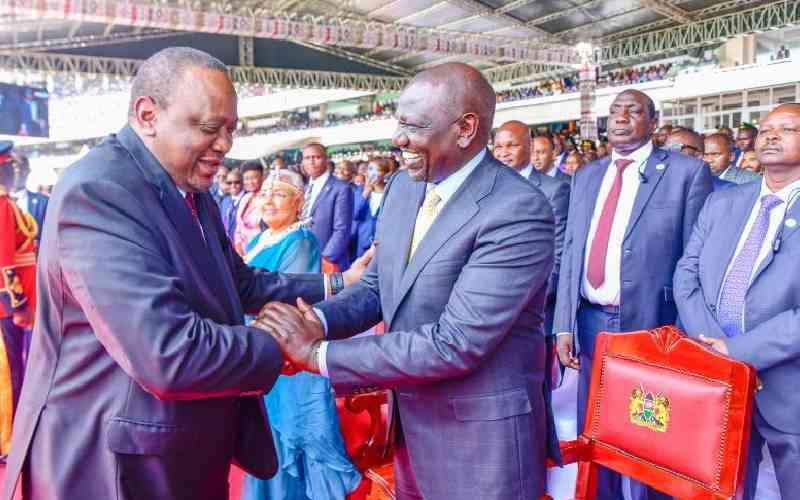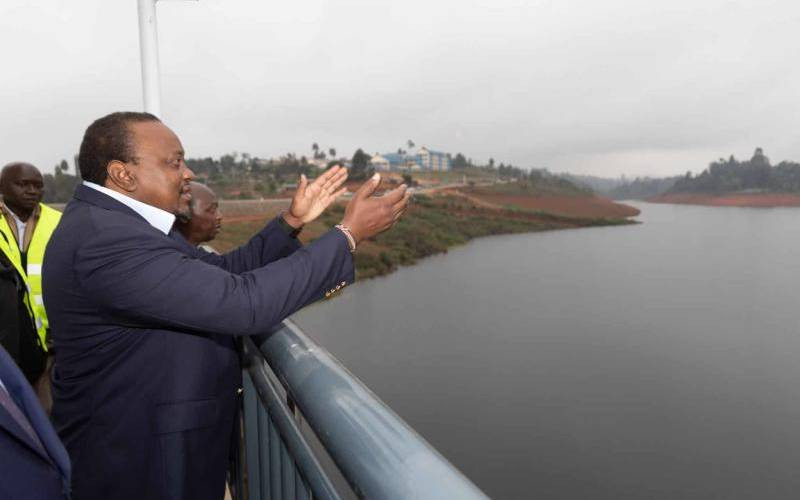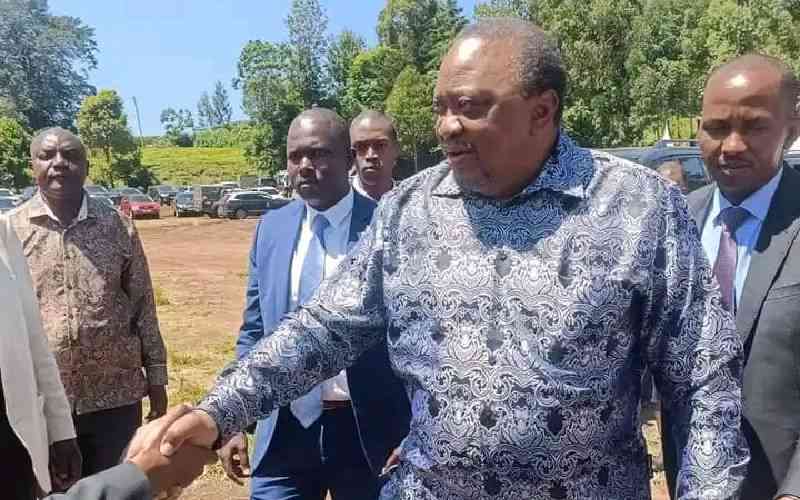 |
|
President Uhuru Kenyatta arrives at the Jomo Kenyatta International Airport to fly to the International Criminal Court (ICC), in Netherlands |
A status conference at the International Criminal Court on the Government of Kenya’s co-operation with the ICC ended in a deadlock yesterday ahead of President Uhuru Kenyatta’s historic appearance before the court today.
The prosecution led by lawyer Benjamin Gumbert insisted on a finding of non-compliance on the part of Kenya as Attorney General Githu Muigai held his ground that the co-operation requests submitted were not "actionable".
Uhuru arrived in the Netherlands Tuesday evening.
Judges Kuniko Ozaki (Presiding Judge), Robert Fremr and Geoffrey Henderson grilled both sides in an attempt to strike some understanding to no avail, which means it is now left to the judges to decide the fate of the case against Uhuru.
At the heart of the dispute is the prosecution's claims that the Government declined to hand over financial and telephone records that the prosecutors are banking on to keep the case alive, having admitted that the available evidence is not enough to sustain trial.
FISHING EXPEDITION
But Uhuru's lawyers argued that the prosecution is on a fishing expedition and the AG yesterday cited the prosecution's admission that they weren't even sure how many mobile telephone numbers allegedly belonging to Uhuru they wanted investigated.
Chief Prosecutor Fatou Bensouda wants to be provided with detailed telephone, tax, land, trusts and vehicle records of Uhuru for the period preceding and after the post-election violence of 2008. Only in this way can she revive or drop her crimes against humanity case against Uhuru, she has said.
"It's still our position after two hours of this status conference that there is still no indication that the Government of Kenya will provide the records required. As long as that remains the case, it remains a deadlock," Gumbert told the judges when asked to review the situation after two hours.
"It's totally untrue to say that we have deadlocked today because the Government of Kenya is unable to provide the records required. We came here with many alternatives, including our request that we be given actionable material," Githu responded in his final submissions.
Ozaki observed in her final closing remarks: "That brings us up to the conclusion of today's business. We have noted submissions and we will take them into consideration when making the final decision."
Judge Henderson brought the dual status of Uhuru as an "accused" and as "President of Kenya" into the mix. He said he had found the case "quite unusual because the person who forms the basis of the co-operation request is himself a holder of a high constitutional authority".
But Prof Muigai countered his argument thus: "The International Crimes Act which domesticates the Rome Statute in Kenya provides for only three focal points in as far as ICC engagement in Kenya is concerned: The Ministry of Foreign Affairs, the Ministry of Internal Security and the Attorney General."
Henderson simply cut his line of questions and thanked the AG.
Uhuru arrived in The Hague yesterday in his capacity as an accused private citizen after transferring power to his deputy William Ruto who is now the acting President of Kenya. Uhuru made the decision so as not to subject the sovereignty of Kenya to the court. It is expected that the matter of his dual status will feature again in today's conference.
Stay informed. Subscribe to our newsletter
At the end of yesterday's conference, Gumbert left a clear impression that the prosecutor wants a finding of non-compliance against Kenya granted and the matter referred to Assembly of States Parties.
Githu argued that the prosecution had also not demonstrated commitment to resolving the impasse, citing a case when he invited to his office one of the prosecution officials who happened to be in the region. The AG told the judges the ICC official never showed up and neither did the prosecution respond to a follow-up email.
Asked by Ozaki about the utility of the records if received, Gumbert said it remains speculative as to their usefulness. He said the "speculation door" cannot be closed until the prosecution receives all required records.
"It is difficult to measure degrees of speculation. We say frankly we do not know what is contained in the body of documents we are seeking. Nothing that we have received so far makes our case against Mr Kenyatta any stronger but we have not received a larger part of our requests," he said.
Earlier in the year, Bensouda had told the court that the prospects of obtaining enough evidence to redeem her case through the records requests remained largely speculative. Yesterday, Ozaki wanted to know if her assessment had changed after receiving a few documents.
LONG DELAYS
During yesterday's status conference, Githu was taken to task over alleged long delays in responding to prosecution letters, arranging "co-operation meetings" and the reasonableness of some of his responses to the prosecution.
He was cut short several times by an alert Ozaki after he deviated from the line of questioning. Ozaki demanded that he "be more focused" on her questions.
Judge Ozaki: Is it reasonable to ask the prosecution to provide the PIN provided by your own Government?
AG Muigai: Yes, that is the law. I have no way of knowing Uhuru Kenyatta's PIN. It must be availed to me.
Ozaki: Is it not the same number that would be required in respect of land and tax records?
Muigai: This is the heart of the problem in this matter, that the prosecution wants....
Ozaki: Mr Attorney General, I do not want you to repeat anything you have said before.
Muigai: Perhaps I need to explain more about the PIN...
Ozaki: No. You do not need to explain to me. I have already understood.
At some point, Ozaki reminded the AG that status conferences are convened by the judges to "ask specific questions to specific participants" in order to guide them in planning and moving forward.
On the telephone records, Gumbert told the conference that they had made inquiries on a number ending with 891 said to have been used by Uhuru over the post-election violence period.
"Sadly, they are partial. We have only information on incoming calls, not outgoing. Also it shows Mr Kenyatta, if the number is his, was only in contact with five other numbers for the period of December and January 2008," Gumbert said.
He said the prosecution could not give the AG other numbers because "we do not have them". He said that was what the prosecution sought from the Government.
Githu said Gumbert's submissions were a clear admittance that the prosecution did not have "critical information" against Mr Kenyatta as earlier stated during the confirmation of charges hearings. He said there was no evidence Uhuru was given a telephone number in his capacity as a minister.
He said witnesses the prosecution interviewed should have identified a specific number through which Uhuru allegedly called.
The AG dismissed both the prosecution and judge's plea that he tries "alternative methods" to obtain the records. Prosecution had suggested records could be obtained from Uhuru's wealth declaration records while the judges suggested the idea of obtaining consent from Uhuru himself.
BANK RECORDS
"We have no extra-judicial, extra-legal measures to resolve this," he stated. He complained that the prosecutor had opposed the idea of consent when the Government attempted that route over the bank records.
Githu's explanation on why Uhuru's income tax returns could not be made available came under sharp focus at yesterday's proceedings. Ozaki said what was provided did not appear to be the actual income tax records as sought. Gumbert affirmed this by waving a blank copy of a Kenya Revenue Authority (KRA) income tax form.
Githu explained that once KRA receives the self-assessed income tax records, it extracts the relevant information and processes the income tax declaration against the individual concerned. He said the original income tax records are not kept.
"This letter is not clear whether the records are kept or destroyed," Ozaki countered.
Gumbert said the claim that the records are destroyed was a new claim as far as the prosecution was concerned.
Uhuru's defence lawyer Steven Kay told the court that he had previously given consent on Uhuru's bank records for a specific period of three months.
He said he stopped that approach after he realised he was getting "less credit than deserved" and after he realised it was gravitating towards "a situation where the accused would have to prove his innocence".
He had given another consent on Uhuru's motor vehicles until it proved unreasonable.
"The prosecutor came back asking for records of all vehicles used by Mr Kenyatta. How on earth were we going to get details of every vehicle he hitched a lift from?"
Yesterday, Ozaki turned down Githu's request to appear as "a friend of the court" in today's status conference of participants in the case.
She said she had already ruled on the matter of the conference being for participants only.
 The Standard Group Plc is a
multi-media organization with investments in media platforms spanning newspaper
print operations, television, radio broadcasting, digital and online services. The
Standard Group is recognized as a leading multi-media house in Kenya with a key
influence in matters of national and international interest.
The Standard Group Plc is a
multi-media organization with investments in media platforms spanning newspaper
print operations, television, radio broadcasting, digital and online services. The
Standard Group is recognized as a leading multi-media house in Kenya with a key
influence in matters of national and international interest.
 The Standard Group Plc is a
multi-media organization with investments in media platforms spanning newspaper
print operations, television, radio broadcasting, digital and online services. The
Standard Group is recognized as a leading multi-media house in Kenya with a key
influence in matters of national and international interest.
The Standard Group Plc is a
multi-media organization with investments in media platforms spanning newspaper
print operations, television, radio broadcasting, digital and online services. The
Standard Group is recognized as a leading multi-media house in Kenya with a key
influence in matters of national and international interest.









